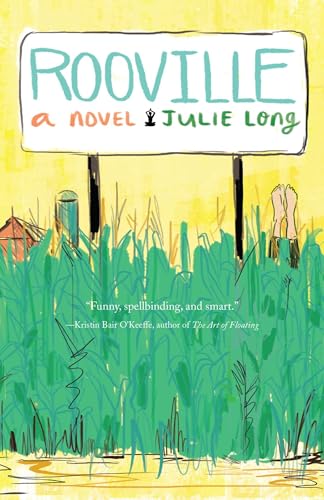Some people live in one place their whole lives. Others of us are more nomadic, making homes all over the country or the world. For people in the latter group, there is almost always a place that stands out in memory as the place they'd want to go back to someday. That place might be the place they grew up, had a particularly wonderful stretch of years, or close friends or dear family nearby. In Julie Long's quirky novel, Rooville, main character Owen Martin wants to go back to the small Midwestern town his family founded and where he grew up happy and settled until the untimely death of his father.
Thomas Wolfe's famous adage about not going home again reminds us all that the place of our memory is long since changed, as are we ourselves. When adult Owen, a television meteorologist in California, commits the unthinkable act of showing his viewing audience weather elsewhere, where it's not perpetually 75 and sunny, he loses his job. He's only momentarily regretful about the job though and when he hears that his aunt and uncle might just sell the family farm because it will otherwise sit empty, he sees it as a golden opportunity to head home to the place his heart is anyway: Martinsville, Iowa. He longs for that sense of belonging he's always missed in California, the nice Midwestern values he was raised with, comfort food, basketball, and, yes, real weather. But when he gets back to Martinsville, he discovers that it is not the sleepy little farming hamlet he remembers. In the intervening years, it's become the US headquarters for the transcendental meditation movement. The diner he was so looking forward to visiting has been replaced by a vegan restaurant. The local university lost its accreditation and was bought by the late Maharishi to teach his principles to his adherents. Meditation and yoga and other New Age practices abound. Stores have all been redesigned so that people have to enter from the east, even if that means entering through an alley rather than a former front door. And the new residents and the old residents are not co-existing with each other as well as might be hoped. The town is split along "Regular" and "Roo" (short for guru) lines.
Owen is fairly unhappy with his discoveries about the town but he's about to get caught firmly in the middle of it all. He is leery of the "meditating mayor" but is attracted to Trishna, the mayor's daughter, an ardent meditator herself. He agrees to coach the Maharishi High girls basketball team after their coach can't finish out the season. He loves basketball but has to come up with alternate ways to coach and relate to these girls; they have such a different mindset from Owen. When he puts aside his prejudices about the meditating town folk and his skeptical views of their practices, he learns to connect with the girls as individuals and as a team. But this knowledge of connection and understanding is unfotunately easily lost to him as he tries to find a way to forge a relationship with Trishna but then discovers that her father plans to buy the Martin farm, his personal heritage, and turn it into a meditation amusement park.
Owen feels the pull of his past and of small town life, not stopping to think to the future and how change can sometimes be a better, albeit scary, thing, a wonderful opportunity never before thought of. He is busy trying to fulfill what he assumes would be his late father's wishes without reference to what makes Owen himself happy and or what does the most good for others. It is only in compromising and learning to accept difference that Owen will find happiness, open himself to love, and truly feel like he's found his home, changed though it might be. The story as a whole is a little bit wacky (although the town is in fact based on a real place) and the ending is a little preposterous and over the top (then again, the reader sort of it expects it by the end) but in general it's sweet and kooky and it has a wonderful farting English bulldog, Stella, in it. Long has done a good job showing the extremes that breed fear, rejection, and divisiveness and of the ways in which a little attempt at understanding can make such a mutually beneficial difference. This is an amusing and fast-paced novel that reminds you that you can't go home again but that might be the best thing after all if it helps you to grow, accept change, and learn new and different things.
Thanks to the publisher and Book Sparks PR for sending me a copy of the book to review.








No comments:
Post a Comment
I have had to disable the anonymous comment option to cut down on the spam and I apologize to those of you for whom this makes commenting a chore. I hope you'll still opt to leave me your thoughts. I love to hear what you think, especially so I know I'm not just whistling into the wind here at my computer.